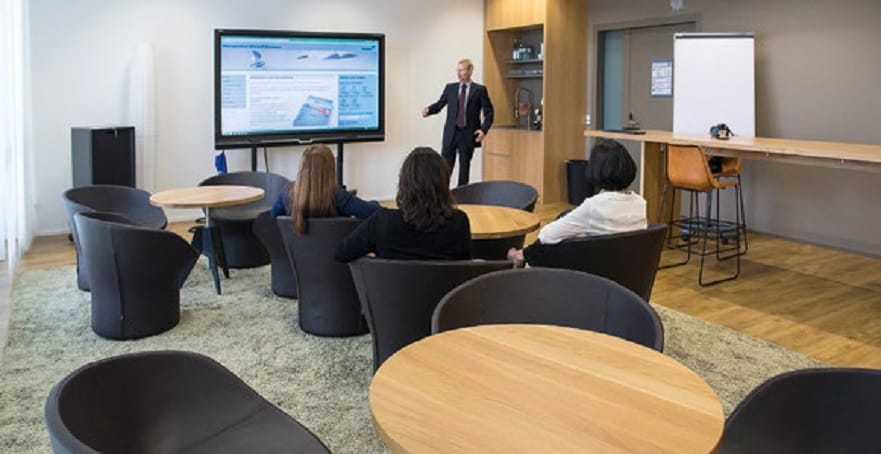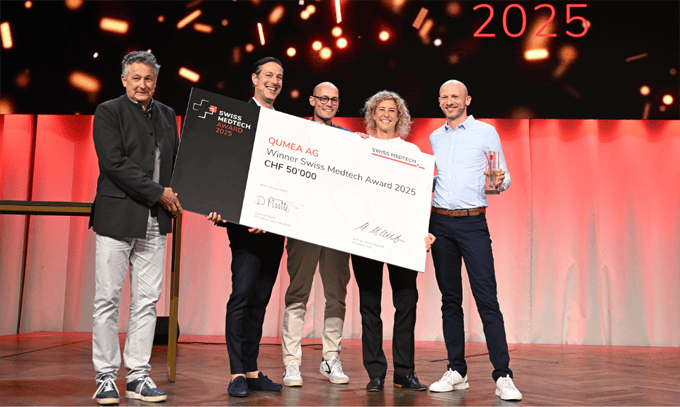"Learning among friends"
The Weinfelden Business Education Centre in the canton of Thurgau offers a wide range of courses and training in the fields of business, languages, personality and IT. One of the premium products is the Höhere Fachschule für Wirtschaft, which is aimed at professionals from business and administration with a commercial background. Prorector Roger Peter, Head of Continuing Education, answered our questions.

The education landscape in Switzerland is complex. Dual vocational education and training can be described as a recipe for success, but learning continues even after completion of the apprenticeship. The range of continuing education courses on offer is correspondingly broad. The Weinfelden Business Education Centre (BZWW) alone offers over 200 continuing education courses.
Mr Peter, how are the services offered by the Weinfelden Business Education Centre currently being used?
Roger Peter: We have been offering a very broad range of courses for many years now, which are actively used - more intensively from year to year. In 2014, we once again recorded a record number of participants: With almost 4,400 course participants, we exceeded the 4,000 mark for the first time - and by a significant margin. The increase has never been as great as from 2013 to 2014.
Which courses are particularly well attended?
These are mainly courses leading to federal or international qualifications and language courses.
To what do you attribute the lively participation in your continuing education courses?
Our principle of "learning among friends" contributes significantly to our success. Of course, new forms of learning such as e-learning, mixed learning and teleteaching also have their place with us. However, face-to-face learning in a group where the chemistry is right continues to enjoy the greatest popularity. It is important to us to create a feel-good atmosphere for learning. One example of this is our education lounge: courses in which participants have to open up personally are much easier in an appropriately adapted learning environment.
Do you also see economic reasons for the success of your educational institute?
We have noticed that the course participants pay a lot of attention to using those offers that really bring them a step further in their professional or private life. They identify knowledge deficits in themselves and want to overcome them in order to increase their chances of keeping their job or developing further. Every further education is questioned in this sense, because in the end it should have a positive effect in the workplace (also financially) or in the private sphere - e.g. in the exercise of an activity that is important for the work-life balance.
With the "Gold Series" you also offer special courses for managers. What exactly is the idea behind these events?
With this series of courses, we want to offer exclusive leadership seminars with an attractive price-performance ratio. It is a well-known fact that the time of management members is precious. That's why you have to be able to pick them up with top speakers and an attractive learning environment. For this reason, the seminars take place in a golf and wellness hotel, where a good learning environment can be created, the support is good and where the pleasant can be combined with the useful. Many participants arrive a day early in order to take advantage of the wellness facilities.
So almost like a vacation?
Holiday mood may well arise, but first and foremost, of course, there is work. An important element is the practical transfer. So it is not a question of "only" giving suggestions. What is learned is immediately put into practice. For example, the participants of a rhetoric seminar have the task of writing their own speech for a "real" occasion.
Where do you see the particular strengths of your offer?
We regularly evaluate the needs of the participants, the majority of whom come from the canton of Thurgau. The courses bring together people who have the same interests in at least one area and come from the same region: the best conditions for networking among the participants, but also between participants and lecturers. We support the community idea in many ways. In addition to the feel-good atmosphere already mentioned, it is certainly also the flexibility of our course offering: we react very quickly to trends and also to the needs of employers and customers. The high level of practical relevance of our courses and seminars is a major reason why we have an exceptionally high proportion of long-term regular customers.
Where do you see development potential for continuing vocational training? What would have to happen in terms of education policy?
In Thurgau, continuing vocational education and training and higher vocational education and training are well promoted. Throughout Switzerland, the discussion about upgrading higher vocational education and training compared to academic degrees is being conducted with great intensity. The first signs of success are emerging. I see the way many SMEs deal with the promotion of their employees as problematic. Often too little is done. Only when educational deficits are identified is action taken. Usually it is then too late. SMEs should be much more proactive and think in the long term when it comes to training.
Where do you see the reasons for this situation?
In many companies, it is a question of resources and time or the priority assigned to this topic. The value of training is underestimated. More should be done, because recruiting new employees costs more than promoting talent internally.
What do you expect from the new Continuing Education Act that is currently in the pipeline?
In principle, the new Continuing Education Act strengthens continuing vocational education and training and higher vocational education and training compared to academic courses. This is certainly a positive development.
Change of subject: The BZWW is EFQM Recognised for Excellence. What do course participants notice about this and how does the EFQM model also affect you economically?
We are one of the few educational institutes that have received the "Recognised for Excellence 4 star" award. We received the award in 2014 after intensive preparatory work. We have consistently committed ourselves to the continuous improvement process (CIP). Course participants, who are actively involved in the process, benefit from this in a variety of ways. The focus on customer needs plays a major role for us. The effects of this can be seen in the many positive feedbacks we receive. We regularly evaluate the feedback and in 2014 we were able to state that the participants gave us an average rating of 5.4 out of a maximum of 6. However, we are not taking this great result as an opportunity to rest on our laurels. We still see potential for improvement. In general, the EFQM model offers us a good set of tools for quality assurance.
What are the next goals of the BZWW? What new continuing education offers are planned or in the pipeline?
We will expand our offering to include more courses and courses that are internationally recognized, such as the "Project Manager IPMA", which we have had in our program for several years. Of course, we are always picking up on new trends, not only in IT, where technical developments have a particularly strong influence. We are always up to date and offer appropriate training and further education. When it comes to the annual programme, we leave hardly a stone unturned: In each new course programme, dozens of new courses are added, while just as many are dropped again.









